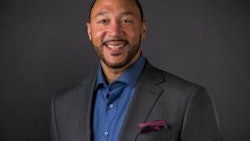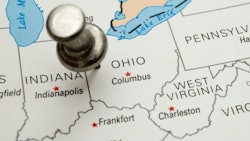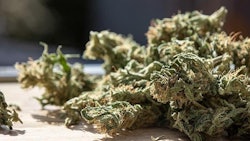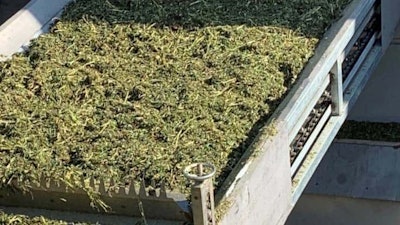
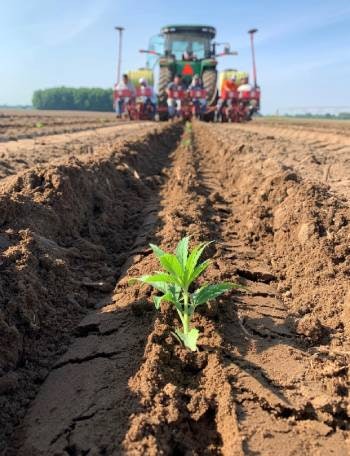 ag marvels hemp
ag marvels hempSince early 2019, as the hemp industry took off around the U.S., Mike Klumpp and his family watched the market positively explode from their vantage point in central Michigan. They run Ag Marvels, a sprawling farm that got into the hemp business as soon as it was possible in the state.
As they got up and running, the team soon saw a need for processing infrastructure. Biomass was booming, and farmers needed a place to dry, store and extract. At Ag Marvels, equipment streamed in and buildings went up. The past few years have been an exciting dash through the nascent hemp business, and the underlying theme has been one of scale. How big does a business need to be to accommodate the twists and turns of hemp?
And how does a business team know if it’s on the right path?
We spoke with Klumpp about the ongoing work at Ag Marvels to get a sense of how R&D and market analysis turns into day-to-day business.
Editor’s note: This interview has been edited for length, style and clarity.
Eric Sandy: How long has your farm been in the hemp game?
Mike Klumpp: We've been farming here for a little over 20 years. We farm around 3,000 acres here, the bulk of which is [USDA] organic-certified, mostly corn and soybeans—and some dry beans in the past. We got involved in hemp two and a half years ago now, when it became legal here in Michigan. As entrepreneurs, we own several other businesses in Michigan, most of them relating to ag in some way, shape or form. We jumped on the hemp train, if you will, and started planting hemp on our own farm—all organic-certified. Then, seeing the need for a drying facility, we put up a biomass dryer and then shortly after started building the processing facility here in Michigan to extract CBD and things—just looking at what that need was.
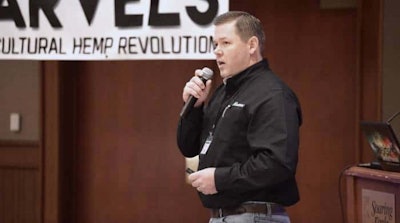 mike klumpp ag marvels
mike klumpp ag marvelsMK: We're still in the learning curve here, two and a half years later, so we're still learning stuff every day. But, yeah, it's a different crop to grow. We grow it mostly on a large ag scale. We’ve tried growing it at a smaller scale with plastic and drip line and those kinds of things, like smaller cultivators might be used to. We probably got sidetracked a little bit from advice that we had out there from a lot of people from the marijuana industry coming over into the hemp and giving us their advice on how to caretake these plants. A lot of those things don't cross over. They don't work in large-scale ag, you know?
ES: With the decision to get into drying and processing, how did you plan for the scale that you were going to be working with in terms of biomass that was coming in?
MK: We ramped up our farm operation and planted more hemp here on our farm. And then we did do some contracts with some farmers a year ago. We supplied seeds and starts for farmers. We'd raise starts in the greenhouse, supply [farmers] with those, and put people in a contract where we would process their material back for them. This year now, we’ve only had a couple of contracts this year, but there's so much material on the marketplace right now. We've just been able to buy material on the open market to feed what we need at this point.
ES: How did you dial in your drying technique?
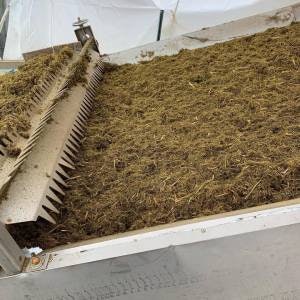 ag marvels hemp
ag marvels hempMK: There's 100 different ways to skin this cat, as they say. It really just some air and some heat. It doesn't have to be anything over-the-top crazy. You want to try to dry it with as a little heat as possible, to maintain the integrity of the plant. We try not to dry anything over about 120 degrees Fahrenheit. That’s about the warmest that we dry at. That’s sufficient enough to dry the plant, but we've used all sorts of different things—different kinds of biomass dryers. We've done the hang-drying biomass belt conveyors. There are cylinder tube dryers. We’ve tried some aeriation floors. We’ve done a lot of R&D around here to try to figure out the best ways and methods at which to do this, especially when you get to scale. It’s different to dry 500 plants than if you're going to dry 100 acres. It’s different equipment that you're looking at.
ES: And for 2021, how many acres are you working with—at least on your property there?
MK: In 2021, we've scaled down considerably here on our farm, because we were able to purchase a lot of biomass out there. All together, we have a couple of different plots: 60, 70 acres, something like that.
ES: Could you talk a bit about the Great Lakes region’s humidity and whether that plays a significant role in the drying process here?
MK: We're a lot different than drying out West, you know? We’ve talked to some people we work with out in, say, Oklahoma. I mean, they can literally chop their plants down and let them dry in the field because the climate out there is so air-dry. They get the wind. Here in Michigan, that doesn't work. We have a lot of moisture. We have wet falls, where it rains every other day in the fall. So, we really have to keep an eye on that here. The minute we harvest these plants, we have to be getting them inside some sort of drying process and get them stored and put away correctly—or you're going to have problems.
ES: In terms of that drying R&D that you've been doing over the last couple of years, how are you evaluating that? Of course, yield is one thing, but how did you know what was working best for you?
MK: Well, we look at it from a lot of different angles. We look at it from just a massive throughput: How fast can we dry? Obviously, [we look at] the quality that comes out the other end. Probably the very best way to dry these plants would be to hang-dry them and hand-buck them—if you wanted to keep the utmost quality of the plant. But when you [try] that at scale, you can't do it. So, it's the sacrifice of quality versus quantity. That’s what we've been trying to figure out: How bulk can you go and still maintain the integrity that you feel needs to be there, and yet do this at a scale that makes commercial sense?
ES: On that commercial side, obviously CBD is still a marquee item, but are you pulling off different isolates for other products? What are some of the different end games that you're working toward after you've processed your hemp?
MK: We produce your typical CBD crude distillate and isolate. We also work with some CBG, and isolate that as well. We’ve also gotten into some cannabinoid conversions. We sell a fair share of CBN isolate out in the marketplace. We’re a bit more diverse, maybe, than some, where we do the conversions and can really put it in any form that you're looking for.
ES: How are you engaging with Michigan consumers—or even consumers outside of Michigan—to help explain what these products are?
MK: The two in-house brands that we service here are Heirloom Grove and Funny Farm. Both are fairly new brands. The Heirloom Grove brand does have probably 20 SKUs or so right now, an array of products from bath bombs to tinctures to muscle relief pain gels. It has a pretty good, wide array of products. Funny Farm just got started in the edible market. It has a few edibles out there.
The problem with the CBD market or any of these cannabinoids: It's the education piece that you have to bring and let the public know what this stuff does, what it can do for them, and then let them decide if they need it or want to try it or not.
That’s the hardest thing with marketing this stuff: You have to bring the education to the people, because most people aren't just going to reach out and do that on their own. They’re looking for somebody to pitch that to them. You might get somebody to read an article or something, and then want to try a product, but you definitely have to bring the education piece to them—especially when we get outside of the CBD realm. People are starting to get a little bit more favorable to CBD products and know a little bit about what they do, but when you ask most people about CBG or CBN or D-8 or something like that, they often have no idea what you're even talking about.
"We continue to scale, and it’s probably something people are sick of hearing out there in the industry, but you have to be on scale in this industry to make this work."
- Mike Klumpp, Ag Marvels
ES: Out of curiosity, because we've been writing about it recently, are you guys doing anything with delta-8?
MK: We used to, but we are no longer currently. Michigan has legislation right now that passed the House and is onto the Senate to essentially make D-8 illegal here in the state. I’m pretty sure it's going to pass. So, we gracefully bowed out of that game. I guess I see where they're going with that. I think D-8 does need to be regulated. It does get people high, and it’s stuff that we probably shouldn't have on a gas station shelf that any kid in the street could come buy. I 100% agree with that, but it'd be nice if they would do something to help us regulate it, instead of just say, “Hey, it's illegal. We're not going to allow it.”
As hemp processors and growers, and hemp growers around the country, that was a big market for us. I mean, that really started to help push the CBD industry forward. There is a pile of CBD isolate out in this country that is being made into D-8 products. This kind of legislation that's being crafted state by state around the country is really going to hurt us at the end of the day. I wish they would do it a little different way, and I wish, like everybody does, the FDA would get involved and we would start to put something around this whole monster to try to steer it the right direction.
ES: Looking ahead to the second half of 2021 and the back half of the season here, what are some things that you're hoping to accomplish?
MK: We’re continually scaling here. We're looking for another piece of real estate right now—another building to put up another processing facility. We’re actively looking for that. We're purchasing lots of equipment around the countryside. We have four or five different pieces being shipped in from around the country as of today. It’s a scale for us here. We continue to scale, and it’s probably something people are sick of hearing out there in the industry, but you have to be on scale in this industry to make this work. That’s really [what we are] striving for. It’s hard because you have to scale on every end: You’ll scale for biomass extraction, but then you'll be just buried in crude. So, you have to scale your distillation operation. Then, before you know it, there's a big call for CBN or something. So, then we have to scale our conversions lab. It’s a never-ending battle for us, but that's definitely a big thing for us.
We’re also teamed up with the University of Illinois in a hemp research study that they're doing out here. We’re helping them grow some different cultivars and doing some research on them, looking at some different genetics as a fun project that we have going on.
We’re also involved deeply with MDARD [the Michigan Department of Agriculture and Rural Development] out here. We’re working together a lot and helping train their inspectors. Michigan's changed up the way that they're doing their testing this year. They're actually sending an inspector to the site this year to pull samples from farmers’ fields to send in, and they've reached out and asked for some help to train their inspectors on what hemp is and what they should be looking for.
Heirloom Grove has got some pretty big stuff going. We’re actually redoing a property that we have and Heirloom Grove’s expanding there and looking to bring some agritourism up here. We planted a bunch of sunflowers out there and an orchard, where we’ll bring some people in to teach them about hemp and do some you-pick sunflowers and different things just try to get more people educated.











